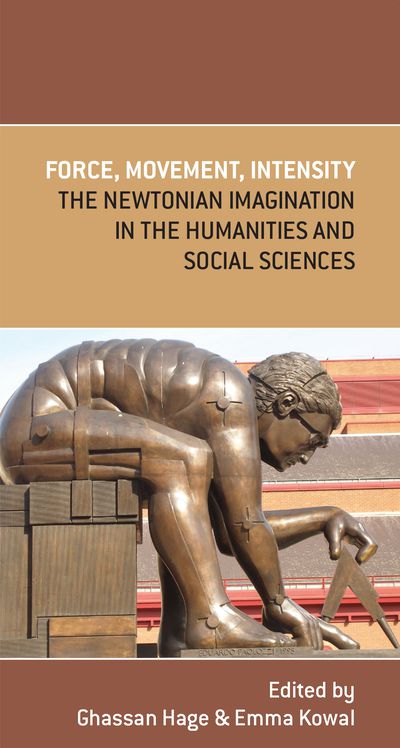Force, Movement, Intensity
The Newtonian Imagination in the Humanities and Social Sciences
Ghassan Hage (editor), Emma Kowal (editor)
Paperback
Ships in 4-6 weeks
Member discount
As an MUP member you get 40% off the price of this book.
Member discount
As an MUP member you get 40% off the price of this book.
Member discount
As an MUP member you get 15% off the price of this book.
Member discount
As an MUP member you get 35% off the price of this book.
Member discount
As an MUP member you get 40% off the price of this book.
Member discount
As an MUP member you get 45% off the price of this book.
Member discount
As an MUP member you get 50% off the price of this book.
Member discount
As an MUP member you get 55% off the price of this book.
Member discount
As an MUP member you get 100% off the price of this book.
Member discount
As an MUP member you get 30% off the price of this book.
Member discount
As an MUP member you get 25% off the price of this book.
Member discount
As an MUP member you get 25% off the price of this book.
Member discount
As an MUP member you get 25% off the price of this book.
Member discount
As an MUP member you get 25% off the price of this book.
Member discount
As an MUP member you get 40% off the price of this book.
Member discount
As an MUP member you get 10% off the price of this book.
Member discount
As an MUP member you get 10% off the price of this book.
Member discount
As an MUP member you get 40% off the price of this book.
Member discount
As an MUP member you get 45% off the price of this book.
Member discount
As an MUP member you get 50% off the price of this book.
Other formats available
- Ebook$31.99 $31.99 $31.99 $31.99 $31.99
Force, Movement, Intensity
The Newtonian Imagination in the Humanities and Social Sciences
Ghassan Hage (editor), Emma Kowal (editor)
Of all the scientific works that have influenced the social sciences and humanities, none has matched the profound effect of the work of Isaac Newton. In his 1687 masterpiece Principia Mathematica he laid the foundation of classical mechanics in his discoveries of the laws of motion and the law of universal gravitation. He reoriented human understanding of the cosmos, thus boosting the confidence of human beings to access elements of what they saw as the divine logic behind the order of things and to have a sense of control over it. From the nineteenth century to the present day, Newton's science has inspired scholars of society in their attempts to discern the patterns of social life. For others, such a positivist project serves as a cautionary tale to be resisted by contemporary social sciences
This book considers the original and continuing legacy of Newtonian theories and imaginaries in the vast…
Of all the scientific works that have influenced the social sciences and humanities, none has matched the profound effect of the work of Isaac Newton. In his 1687 masterpiece Principia Mathematica he laid the foundation of classical mechanics in his discoveries of the laws of motion and the law of universal gravitation. He reoriented human understanding of the cosmos, thus boosting the confidence of human beings to access elements of what they saw as the divine logic behind the order of things and to have a sense of control over it. From the nineteenth century to the present day, Newton's science has inspired scholars of society in their attempts to discern the patterns of social life. For others, such a positivist project serves as a cautionary tale to be resisted by contemporary social sciences.
This book considers the original and continuing legacy of Newtonian theories and imaginaries in the vast array of human attempts to understand the world. Drawing from a range of disciplines; including anthropology, sociology, the history of science, literary studies, cultural studies, social theory and economics; the essays in this volume engage with Newton as a thinker and examine his legacy. Some contributions illustrate the power of physical metaphors in understanding the social world; many others point to the limits of this endeavour. Still others show how since the eighteenth century Newtonian thought has influenced thinkers as diverse as Blake, Marx, Freud and Pierre Bourdieu. This innovative collection prompts a reconsideration of the importance of Newton for the social sciences and humanities.
Paperback
Ships in 4-6 weeks
Member discount
As an MUP member you get 40% off the price of this book.
Member discount
As an MUP member you get 40% off the price of this book.
Member discount
As an MUP member you get 15% off the price of this book.
Member discount
As an MUP member you get 35% off the price of this book.
Member discount
As an MUP member you get 40% off the price of this book.
Member discount
As an MUP member you get 45% off the price of this book.
Member discount
As an MUP member you get 50% off the price of this book.
Member discount
As an MUP member you get 55% off the price of this book.
Member discount
As an MUP member you get 100% off the price of this book.
Member discount
As an MUP member you get 30% off the price of this book.
Member discount
As an MUP member you get 25% off the price of this book.
Member discount
As an MUP member you get 25% off the price of this book.
Member discount
As an MUP member you get 25% off the price of this book.
Member discount
As an MUP member you get 25% off the price of this book.
Member discount
As an MUP member you get 40% off the price of this book.
Member discount
As an MUP member you get 10% off the price of this book.
Member discount
As an MUP member you get 10% off the price of this book.
Member discount
As an MUP member you get 40% off the price of this book.
Member discount
As an MUP member you get 45% off the price of this book.
Member discount
As an MUP member you get 50% off the price of this book.
Other formats available
- Ebook$31.99 $31.99 $31.99 $31.99 $31.99







